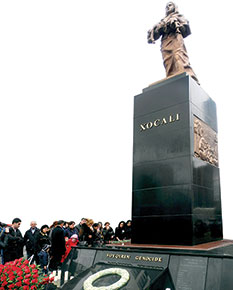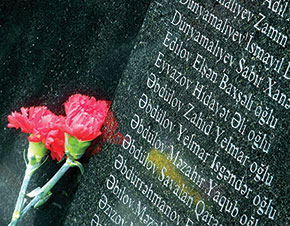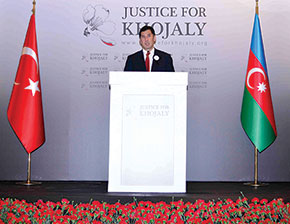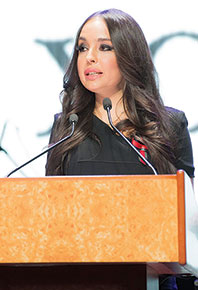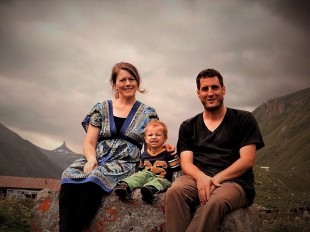For Azerbaijanis, continued separation from their lands in Nagorno-Karabakh and surrounding districts is a constant reminder of the blood and exile suffered in the early years of renewed independence. And no anniversary is more poignant than that of 26 February – the night in 1992 when the people of Khojaly were massacred as they fled Armenia’s invading forces.
This year, Justice for Khojaly, a campaign founded in 2008 by Mrs. Leyla Aliyeva, Vice-President of the Heydar Aliyev Foundation, took a book and a documentary film across Europe to highlight the war crimes committed that night and their continuing aftermath.
In Vision
In late February 2015, The European Azerbaijan Society (TEAS) organised events within the Justice for Khojaly campaign in Dublin, Luxembourg, Ankara, London, Bern, Rome, Istanbul, Berlin, Paris and Vilnius, as well as commemorative concerts in Strasbourg, Brussels, Paris and London. The UK capital also saw an art installation at Chelsea College of Arts.
Screenings were held of Endless Corridor, a documentary film made by the Lithuanian company Culture Bridge and directed by Aleksandras Brokas, which tells the stories of two journalists present during the Khojaly events. The Lithuanian Ricardas (Richard) Lapaitis and Russian Victoria Ivleva were haunted by what they experienced in February 1992 and returned to Azerbaijan to try to find out what had happened to the survivors they had met immediately after the massacre.
The film includes first-hand accounts by the journalists and people of Khojaly, and even by those who planned the attack. It provides compelling evidence of what actually happened that night, and is evidence of both the humanity and inhumanity of people in crisis.
For director Aleksandras Brokas humanitarian issues were to the fore during the long making of Endless Corridor, as he declared at the London screening:
Our purpose was to tell a story in order that it will never be repeated. However, five years on, we see new wars and people are being killed again. We hope that this film will result in the avoidance of fresh conflicts….
H.E. Tahir Tagizadeh, Azerbaijan’s ambassador to the UK, amplified the theme: We are not seeking revenge – we want to administer justice, and that is the only guarantor against repetition of such events.
Narrated by the celebrated British actor Jeremy Irons, versions subtitled in French, German, Italian, Spanish, Turkish, Azerbaijani and Russian were screened at the events in different countries.
In Words
The events also marked the launch of the TEAS book Khojaly Witness to a War Crime – Armenia in the Dock (see Visions of Azerbaijan May-June 2014). It is the first collection in English of first-hand accounts of the Khojaly events – by survivors and international journalists - with photographs and assessments by international human rights organisations. The full texts of the four, notoriously unfulfilled resolutions passed by the United Nations Security Council and other international bodies are also included. Co-editor Ian Peart introduced the book at a number of the events:
When I was asked to interview people from Khojaly I had heard about the massacre, but hearing their accounts gave me a different level of understanding. It is important that we remember this is a story about people just like us, not one of simple statistics.
Themes common to both Brokas’s film and TEAS’s book Khojaly Witness include an insistence on eye-witness evidence of what happened on that freezing February night. Another is their focus on the effect on ordinary people of the invasion of their homeland in a war that is frozen – in theory if not in practice.
Valeh Huseynov survived the night but lost Saadat, his wife of a few weeks, to the bullets that raked across the fleeing townspeople. The story of how he was tortured and what happened when his captors learned that he played guitar, is also told in the film. He gave a first-hand account to audiences in Ankara and Istanbul:
That night in Khojaly, under the Armenian bombardment of our town, we knew we had to escape, despite the constant attack from all sides. Young children were not spared, women were beaten, and even the elderly suffered at the hands of the Armenians. I lost my wife right before my eyes, and could not save her. We were all helpless. I was tortured by the Armenians, who knew that I was a guitarist, yet they broke my fingers and tore out my nails so that I could never play again.
On the Line
In addition to the film screenings and book launches, an outdoor event at the Chelsea College of Arts in London provided a graphic presentation of the human impact of the Khojaly invasion. 613 red T-shirts were hung in a maze-fashion outside the college, each one bearing the name and date of birth and death of someone who lost their life that night. More than 60 had to be marked Unknown Victim – some bodies were too badly mutilated to be identified and some were never recovered. A similar number of shirts were child-sized.
In Music
The moving commemorative concerts held throughout the European cities included classical and traditional Azerbaijani music, as well as music specially written by French composer Pierre Thilloy. His Khojaly 613 was given its Brussels premiere by Sabina Rakcheyeva (violin), Annelise Clément (clarinet) and the Magma String Quartet, and his Lamento – In Memoriam was played in both Paris and London by Nazrin Rashidova and her Femusa Orchestra with Sabina Rakcheyeva. Tar player Arslan Novrasli also contributed to the London and Paris concerts and pianists Renara Akhoundova and Saida Zulfugarova played in Strasbourg.
Compassion and solidarity with the people of Khojaly was very apparent at the concert held in Paris’s Théâtre Adyar. Among the audience were Philippe Lacroix, Mayor of Oradour and Benoit Sadry, Secretary, National Association for the Families of Martyrs. In the French town of Oradour-sur-Glane, 642 innocent townspeople were brutally executed in 1944 by the occupying Nazi forces. This kind of fellow feeling contrasted markedly with the insults that had been daubed on walls surrounding the concert venue.
In Moscow
The campaign’s final event was organised by the Heydar Aliyev Foundation, the Azerbaijani Embassy in Russia, the Azerbaijani Youth Organization of Russia (AYOR) and the All-Russian Congress of Azerbaijanis and was held in Moscow on 27 February. Leyla Aliyeva hosted an evening of commemorative music, children’s art and a multimedia presentation of the events in Khojaly. Addressing the attendees, Mrs. Aliyeva described the events in Khojaly and the aftermath as part of Armenia’s military aggression against Azerbaijan. She stressed the importance of a legal and political assessment by international organisations
Azerbaijan’s ambassador to the Russian Federation, Polad Bulbuloghlu, reflected on the negative impact on development, as well as the chances of achieving peace and security in the region.
Mugham, jazz and classical music dedicated to Khojaly was played by well-known Azerbaijani and Russian musicians, including Alim Qasimov, Fergana Qasimova, Farhad Badalbeyli, Dmitry Yablonsky and Rain Sultanov, and videos were screened.
A new collection of materials explaining the tragedy of Khojaly was also presented. The collection includes documentary DVDs, a book, a booklet, photographs of the Khojaly events and an electronic presentation.
Over 3,000 people attended the Justice for Khojaly campaign events, each one generating interest and energetic debate. This was no academic exercise and as those 3,000 people watched, read or listened to the various presentations, they were urged to:
Think about what you can do to help them return to their homes.
